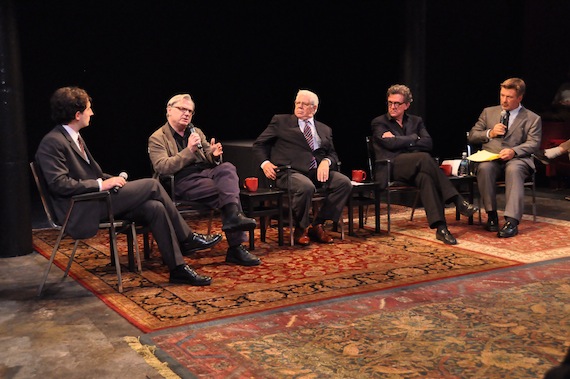
 Jeremy McCarter, Richard Nelson, Carl Bernstein, Kurt Andersen and Alec Baldwin at the Public Forum/Credit: Steve & Anita Shevett
Jeremy McCarter, Richard Nelson, Carl Bernstein, Kurt Andersen and Alec Baldwin at the Public Forum/Credit: Steve & Anita Shevett
Richard Nelson's Sweet and Sad, a play centered around the dinnertime of a folksy Rhinebeck, New York, family questioning the meaning of 9/11, elucidates why many of us feel a tug of shame when we stop to consider how the attacks on our country changed us, if at all. Listening to the simplicity of the Apple family's conversation forced me to admit that we haven't used the lessons of 9/11 to grow. I don't use the word simplicity to mean Sweet and Sad was boring. The endless bickering between family members kept the focus on superficial matters, preventing any meaningful resolution to questionable political policies that arose during their chatter (ie: "Why were the victims of 9/11 compensated while those in the Oklahoma City bombings weren't?"). This was a sad -- and I believe intended -- parallel to our real life.
When we try to wrap our minds around the scope of the tragedy and how our government reacted, we feel helpless. Ten years later, as I watched Sweet and Sad, I kept wondering -- What did I learn from 9/11?
To grasp meaning from questions provoked by Sweet and Sad, the Public Theater follows select performances by opening the floor to a chosen panel of the country's most provocative minds. For my showing, Pulitzer prize-winning journalist Carl Bernstein, Alec Baldwin, author Kurt Andersen, and the director himself were present.
According to Andersen (Turn of the Century, Heydey), our government is guilty of the sin of omission. For months after 9/11, polls showed that nearly 70% of the country felt America was "on the right track." Seventy percent! With all of that nationalism, that pride, that spirit, so much good could have been asked of us. As newly born "patriots," Andersen suggested that we could have added something as simple as an extra $1 of tax on gasoline to support energy independence from the Middle East. But we weren't asked to do that. We squandered the moment and were told to keep calm, carry on and shop. We were asked to go to war. To kill.
Baldwin put it so eloquently when he said, "The U.S. became a drunk in a bar, taking on everybody." Bill Keller said we were drugged with testosterone.
How did that happen?
Bernstein suggested that part of the blame lies on journalism. Instead of presenting the best obtainable version of the truth, the media amplified the message of a small group of demagogues and jingoists with an agenda opposite the national interest. As exclaimed by one of the Apple sisters, the message created a new bond shared between the American people -- the philosophy of "We're f**cked."
During the question and answer session, I asked Carl how the press could improve the message sent to the American people. Carl responded to me that much of that burden ultimately lies on the viewer as well. We, as news consumers, need to reexamine the information we seek out. Do we want propaganda that appeals to our irrepressible need for fear, or do we want to be informed?
So now, with the 10-year anniversary of 9/11 behind us, it's time to sober up. We need to rekindle that strong sense of patriotism we felt in the months after. Where we wanted to take care of ourselves, the sick, the injured and the weak. Our country was united together, not divided against itself.
What I learned from 9/11 was that I want something good to come of it.
Sweet and Sad runs through September 25th at the Public Theater in New York City. Find out more here.